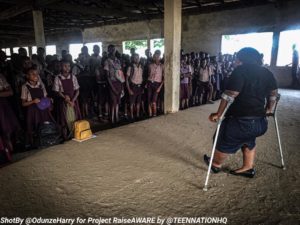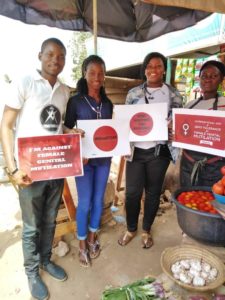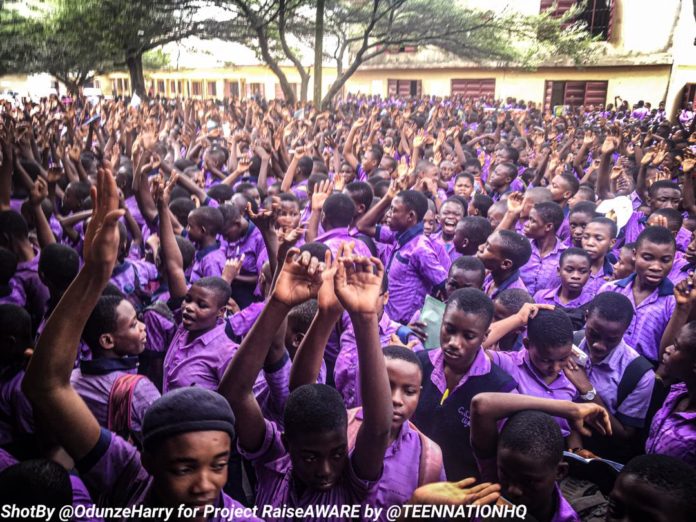Secondary school students on the campaign trail during the 2020 International awareness day to end female genital mutilation in Akwa Ibom state, Nigeria.
• 10,000 students walk for zero tolerance for female genital mutilation
An International organisation working on social issues and the inclusion of teenagers in Africa, Teennation says it will work to end female genital mutilation in Africa.
Executive Director of Teennation, Mmanti Umoh, stated this while leading 10,000 secondary school students in Akwa Ibom state on a two day walk for zero tolerance for female genital mutilation. The walk was to mark the year 2020 International day for the eradication of female genital mutilation.
In 2003, the United Nations set aside February 6, to raise awareness for the eradication of female genital mutilation.
In line with the international day, Mmanti Umoh, said Teennation is working with schools, families and education boards, as part of its strategy and support for local, national and international efforts to combat female genital mutilation otherwise called cutting.
“We welcome the growing number of African countries and states upholding laws that criminalize female genital mutilation/cutting”.
“Though Nigeria has no requisite data to help assuage this pain against children and adolescents, we continue to work with interagency partners to implement the female genital mutilation or cutting outreach strategy. We also will continue to identify opportunities to end female genital mutilation/cutting in Africa.”
READ ALSO : Nigerian government slashes visa charges for U.S citizens by $20
Speaking on the 6th and 7th of February, during the the walk, Umoh said the campaign was aimed to raise awareness about the global crisis caused by the crude traditional practice and to encourage first victims to speak up against female genital mutilation.
“Inspired by the burden that millions of women and children bear every day from female genital mutilation, we walk for zero tolerance for female genital mutilation to raise awareness of the global crisis and the need to stop it in order to save lives.”
“Female genital mutilation is rooted in gender inequalities, and the first step to end it is in providing the first victims adequate information to stand against it, speak up about it, hence the choice of students for the zero tolerance campaign.”
 Mmanti Umoh, addressing students during the zero tolerance for FGM campaign on 6th February 2020, in Uyo, Akwa Ibom state.
Mmanti Umoh, addressing students during the zero tolerance for FGM campaign on 6th February 2020, in Uyo, Akwa Ibom state.
Female Genital Mutilation (FGM) is mostly carried out by traditional circumcisers, who often play other central roles in communities, such as midwives or birth attendants.
Increased prevalence in medicalised FGM obscures global progress on eliminating support for the practice. Twice as many women in high-prevalence countries want the practice to end compared to 20 years ago
In many settings, healthcare providers perform FGM due to the belief that the procedure is safer when medicalised but the World Health Organisation strongly urges healthcare providers not to perform FGM.
 Teens take the campaign on zero tolerance for female genital mutilation to a market in Akwa Ibom state, Nigeria during the 2020 International awareness day to end FGM.
Teens take the campaign on zero tolerance for female genital mutilation to a market in Akwa Ibom state, Nigeria during the 2020 International awareness day to end FGM.
Addressing teachers, parents and students in public schools in Akwa Ibom state, Mmanti Umoh, stressed that FGM regardless of procedure, violates the girl child’s rights to health, security and physical integrity.
“Female genital mutilation is more than a medical issue, it strips away the human rights of girls and young women to lead healthy and empowered lives in control of their own bodies, and as active members in society.”
“Medical practice of FGM does not eliminate the danger it poses to women because it still damages healthy and normal tissue and interferes with the natural functions of a girl’s body”, Umoh added.
During the campaign, the dangers of medicalised FGM were highlighted in the high-profile death of a 12-year-old girl in Egypt in January this year, which prompted international outrage and condemnation by the United Nations and the Egyptian government.
Egypt banned female genital mutilation in 2008 and increased penalty for the practice in 2016.
 Some of the students during the campaign.
Some of the students during the campaign.
In her presentation, the Project Manager, Gender. Image. Rights. Learning (GIRL), Inimfon Ekpuk-Nkop, said FGM can lead to long-term physical, psychological and social consequences.
READ ALSO : Mobil, GTBank owe Akwa Ibom state N24.68 billion PAYE taxes
President of Dala Foundation and Teennation-Benue Project Lead, Damilola Joshua, said about four million girls around the world are at the risk of being subjected to the cruel practice of female genital mutilation in 2020.
“I had absolutely no idea how close this problem had been, this project is an eye-opener.”
“At least 200 million girls and women alive today have undergone FGM in the 31 countries with available data, and 68 million girls are at risk by 2030. In 2020 alone, over four million girls around the world are at risk of being cut”, Joshua noted.
Teennation Head of Projects, Odunze Harry said the walk to end FGM was supported by the Akwa Ibom State Ministry of Education, Benue State Police Commission, AISEC Benue, DaLa Foundation, DestinyJesus, GinuinPixels, Harristography, PurplePatch Consults and some media organisations.
















